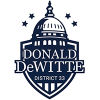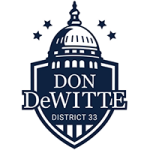

U.S. Representative Rodney Davis provided the following federal legislative update regarding COVID-19.
PHASE I
HR 6074, the Coronavirus Preparedness and Response Supplemental Appropriations Act – President Trump signed into law March 6
-
Provides $8.3 billion in emergency funding for federal agencies to respond to the coronavirus outbreak
- $4 billion to develop testing, therapies, and vaccines
- $1 billion State set-aside for surveillance, testing, and containment
- $500 million to purchase Personal Protective Equipment (PPE)
- $100 million for Community Health Centers to purchase PPE, test and treat coronavirus patients, and expand telehealth capabilities
- Authorizes the Small Business Administration (SBA) to provide Economic Injury Disaster Loans
- Maximum of $2 million/business to be repaid over a maximum of 30 years at 3.75% interest – you have cosigned a letter to SBA requesting this interest rate be 0%
PHASE II
HR 6201, the Families First Coronavirus Response Act – President Trump signed into law March 18
- Ensures the Federal government is partnering with the private sector to achieve free medical diagnostic testing for COVID-19
- Provides states with a 6.2% Medicaid FMAP increase to help states shore up Medicaid financing
-
Provides Paid Sick Leave and Expands FMLA protections, both backed by a payroll tax credit
- These provisions are effective starting April 1, 2020, and apply to leave taken between April 1, 2020, and December 31, 2020
- Employers with 500 or less employees must offer up to 2 weeks paid leave
- Ill or quarantined employees receive 100% pay rate ($511/day cap), those taking care of others receive 66% pay rate ($200/day cap)
- Employers with 500 or less employees must grant FMLA leave for an additional 10 weeks to employees at home caring for a child – at 66% pay rate ($200/day cap)
- The Department of Labor (DOL) has waiver authority for employers with fewer than 50 employees
- DOL has issued guidance instructing employers to document details and facts that form basis for waiver – there is no formal process
- Must show leave would cause employer to cease operating (whether due to financial strain or employee’s skill set) or that the employer cannot find a workforce necessary to operate at a minimal capacity
-
Provides $1 billion in emergency assistance to states to bolster unemployment insurance
- Provides $500 million to States for staffing, tech, and administrative purposes, and $500 million in emergency grants for states who see a 10% increase or more in Unemployment
-
Nutrition Provisions
- Provides $500 million for WIC, $400 million for TEFAP and $250 million for the Senior Nutrition Program
- Ensures students home from school can still receive free/reduced meals
PHASE III
H.R. 748, the Coronavirus Aid, Relief, and Economic Security Act – President Trump signed into law March 27
-
SBA Payment Protection Loans
- Provides $350 billion to create a new Payment Protection Loan program which provides loans to small businesses and 501(c)(3)’s with less than 500 employees, sole proprietors, independent contractors, and self- employed individuals
- These loans are 100% backed by the federal government with an interest rate of 1%
- Loan amounts will be based on 2.5 times the average monthly payroll of the business or $10 million, whichever is less
- Lenders are given delegation authority meaning these loans can be in the hands of small businesses without time consuming SBA authorization
- The program provides for automatic deferral of principal, interest, and fee payments for the first six months
- Amounts used to cover payroll costs, mortgage interest payments, rent, and utility bills over an 8-week period will be forgiven if the business retains employees
- Forgiveness is reserved for employers that maintain payroll continuity from February 15, 2020 through June 30, 2020
- Flexibility is granted for businesses to rehire individuals already laid off and still be eligible
- Failure to maintain payroll continuity does not immediately disqualify forgiveness, instead, if employee numbers decrease the forgiven amount is reduced proportionally based on the prior year’s headcount
- Businesses will work with lenders to establish that it met payroll requirements, at which time the federal government will purchase the loan
- For franchisees in the hospitality and food industries, the loan is available at the store/location level – allowing more small businesses to qualify
- Individuals who have received an SBA Economic Injury Disaster loan may refinance into this new program
-
Unemployment Insurance
- Creates the Pandemic Unemployment Assistance (PUA) program to provide federal unemployment coverage for individuals traditionally not eligible for unemployment assistance
- Includes self-employed and independent contractors
- Available through December 31, 2020 to individuals unable to work due to the Coronavirus
- Calculated based on each state’s average unemployment
- Funding provided for states to administer
- Pays states to cover 50% of the costs incurred through December 31st, 2020 for expenses related to providing unemployment benefits to government, nonprofit, and tribal workers
- Provides an additional $600/week to individuals receiving traditional unemployment benefits or payments under the PUA program – through July 31, 2020
- Individuals who have exhausted state unemployment benefits, are eligible for an additional 13 weeks of benefits through the PUA program
- Creates the Pandemic Unemployment Assistance (PUA) program to provide federal unemployment coverage for individuals traditionally not eligible for unemployment assistance
-
Economic Stimulus
- Up to $1,200 in economic recovery checks to individuals ($2,400 for joint filers) with an additional $500/dependent under 17
- Income eligibility based on 2019 returns if filed, or 2018 if unfiled:
- Individuals with AGI below $75,000 are eligible for $1,200
- Joint Returners with AGI below $150,000 are eligible for $2,400
- Phases out above these thresholds until eliminated at $99,000 for individuals and $198,000 for joint returners
- Income eligibility based on 2019 returns if filed, or 2018 if unfiled:
- Waives the 10% early withdrawal penalty for distributions from qualified retirement accounts (up to $100,000) to cover coronavirus- related expenses
- Waives the required minimum distribution rule for 2020
- Permits a 2020 $300 above-the-line deduction for charitable donations
- Incentivizes businesses to pay down student-debt by providing a tax-free benefit (up to $5,250) for both the employer and employee
- Provides a refundable payroll tax credit for businesses equal to 50% of wages (up to $10,000/employee) paid during the COVID-19 crisis
- Ineligible for credit if receiving assistance through SBA
- Up to $1,200 in economic recovery checks to individuals ($2,400 for joint filers) with an additional $500/dependent under 17
-
Healthcare
- $100 billion for hospitals to keep their doors open to cover cancelled elective operations and declining visits unrelated to coronavirus
- $1.32 billion for community health centers
- Expands Health Savings Accounts (HSA) to cover telehealth services related to COVID-19, and HSA and Flexible Spending Accounts to purchase over-the-counter products
- Allows Medicare reimbursement for telehealth services provided by Federally Qualified Health Centers and Rural Health Clinics during the COVID-19 response period and allows for reimbursement when seen by a new doctor
- Increases Medicare reimbursement for COVID-19 patients by 20%
- Extends Community Health Center funding through November 20, 2020
-
Education
- Defers federal student loan payments for 6 months (through September 30, 2020)
- Provides $30.9 billion to create an Education Stabilization Fund to assist elementary, secondary, and higher education institutions
-
Economic Stabilization Fund
- Provides $500 billion to the Treasury Department to assist severely distressed industries through loans
- Includes a $25 billion set-aside for passenger air carriers, $4 billion set-aside for cargo air carriers, $17 billion for businesses vital to national security, and $454 billion for other industries
- Loans under this program are reserved for businesses unable to receive lending through other means and limited to a 5-year maximum life. Additionally, businesses accepting loans must retain at least 90% of their workforce (as of March 24, 2020) through September 30, 2020 and must be a U.S. domiciled business
- Businesses that accept assistance are prohibited from buying back stock and increasing the compensation of employees making more than $425,000
- Prohibits businesses from receiving assistance if anyone owning a 20% interest in the business is the President, VP, head of an executive branch department, Member of Congress, or any such individual’s spouse, children, or son/daughter-in-law
- Provides $25 billion in grants to passenger air carriers, $4 billion for cargo air carriers, and $3 billion for airline contractors, to cover employee wages, salaries, and benefits
- Prohibits stock buy backs through September 30, 2020, and freezes compensation for employees earning over $425,000 for two years
- Provides the Secretary of Treasury the ability to collect stocks and other such financial instruments in lieu of payment for the grants
- Provides $500 billion to the Treasury Department to assist severely distressed industries through loans
- Coronavirus Relief Fund
- Provides $150 billion for State and Local governments through direct payments to cover expenses related to COVID-19.
- Amounts/State based on the state’s relative population but no less than $1.25 billion – Illinois should receive around $5 billion
Federal Assistance to Illinois
- Illinois has either received, or will receive shortly, the following list of PPEs and ventilators from the Centers for Disease Control (CDC) Strategic national Stockpile:
Topline Total – 3,438,218 pieces
- N95s – 540,523
- Surgical Masks – 1,285,657
- Face Shield – 260,330
- Surgical Gowns – 213,230
- Coveralls – 7,621
- Gloves – 1,130,407
- Ventilators – 450
Chicago’s Share – 1,180,414 pieces
- N95s – 172,763
- Surgical Masks – 410,569
- Face Shield – 85,939
- Surgical Gowns – 70,556
- Coveralls – 3,626
- Gloves – 436,811
- Ventilators – 150
Rest of Illinois’ Share – 2,257,804 pieces
- N95s – 367,760
- Surgical Masks – 875,088
- Face Shield – 174,391
- Surgical Gowns – 142,674
- Coveralls – 3,995
- Gloves – 693,596
- Ventilators – 300
- The Department of Health and Human Services (HHS) has provided nearly $3.7 million to Community Health Centers (Phase I)
- HHS has provided nearly $35.8 million to the State through the Centers for Disease Control to contain the spread of COVID-19 (Phase I and before that through transfers of funds within the Department).
- FEMA has provided $1,374,160.69 to IEMA for state management costs associated with COVID-19 (Disaster Declaration).
- The Department of Housing and Urban Development provided $80.5 million through Community Development Block Grants (Phase III)
- The Department of Transportation provided $1.623 billion for transit districts (Phase III).

